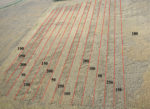Advertise Follow Us
Articles Tagged with ''Nitrates''
Digging For Details Yields Variable-Rate Success
Proper soil-sampling techniques and a calibrated yield monitor can help no-tillers get much more out of their fertility program.
Read More
Management That Makes Nitrogen More Efficient
Planter setup modifications and cover crops are helping an Indiana no-tiller improve his fertilizer efficiency while maintaining high corn yields.
Read More
Apply The Right Amount Of Fertilizer
Soil samples and testing, and determining the amount of nutrients removed by the no-tilled crop, are just some of things you need to do when fertilizing.
Read More
Developing An Anhydrous Strategy Can Cut Costs And Boost Profits
Knowing the precise amount needed and stabilizing nitrogen to avoid losses creates an efficient no-till fertilizer program.
Read More






